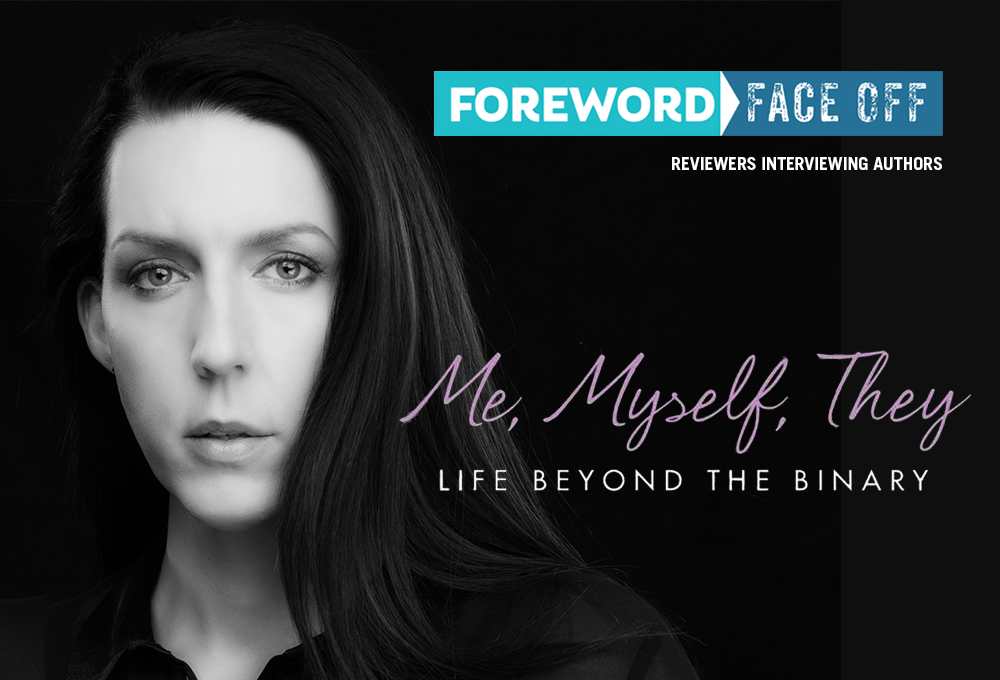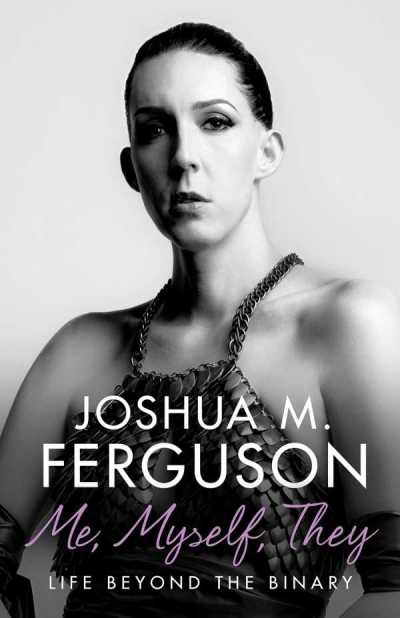Reviewer Claire Rudy Foster Interviews Joshua M. Ferguson, Author of Me, Myself, They: Life Beyond the Binary

Diversity brings about lots of exciting changes to a population, and those of us who embrace a multicultured, pluralist society believe that our lives would be boring without continuous influx and blending of different cultures. In a recent op-ed, New York Times columnist David Brooks calls pluralism the adventure of life. “Pluralism,” he says, “is not just having diverse people coexist in one place. It’s going out and getting into each other’s lives. It’s a constant dialogue that has no end because there is no single answer to how we should live. … Pluralism is about movement, interdependence and life.”
Of course, diversity doesn’t only have a racial component. Just as it’s impossible to limit a person to a single racial identity, much of the nonbinary community believes that the basic notion of gender is flawed—certainly not limited to male or female. Gender, in fact, is subject to any number of configurations. Note that we can have this discussion without ever mentioning “sexuality.”
How cool is that? How thrilling to live at a time when human beings are free to identify however feels right to them (yes, to them, not to him or to her, unless they prefer). And what richness it brings to the rest of us to meet, read of, or otherwise learn about life outside the confines of she or he.

Meet Joshua M. Ferguson, the author of Me, Myself, They: Life Beyond the Binary, a title Claire Rudy Foster offered a starred review in a recent issue of Foreword Reviews. Claire’s excitement caught our attention, so we reached out to House of Anansi to coordinate this interview.
Claire, take it from here.
Your memoir Me, Myself, They is such a courageous work. Was it difficult for you to be vulnerable about the adversity you’ve encountered as a nonbinary person?
The process of writing this book was like taking a trip, not to another place, but deeper into myself (a process that is still happening). And, travelling into my past wasn’t always easy. Writing and feeling some of my trauma again was retraumatizing and I’m still feeling the effects. But, the calling I felt to write my story saw me through the often difficult emotional experiences of writing the book and closer to a place in my present identity where I find deep comfort.
The prospect of being vulnerable is tough for marginalized people. But, I think most artists work from their position and subjectivity in the world. We create from what we find in ourselves. It was alchemical writing this book. Opening up memories and realizing them again on the pages has opened new creative dimensions for me as an artist. In essence, the writing freed me from a heavy past that I felt locked into.
Many of the terms in your memoir explain gender identity, sexual identity, gender presentation, and other concepts that may be new to some readers. How did it feel to “translate” your personal experience to people who may not understand nonbinary identities?
I made a point of saying that everything in the book is based in opinion and my lived experience. Many of the terms that I explained in my book are written through my perspective. I felt that it was important to explain some of the language because people are often caught up in this language and it prevents them from connecting with the humanity of a story like mine. I don’t want to alienate people, I want to bring them in. Translation isn’t always a responsibility of the minority, but I did this work to enrich my empathic reach.
Your memoir is a testament to the power of personal stories to create real change for marginalized people, like acknowledgement, protection, and support at the policy level. How do you hope to change the world with your book?
Thank you for saying that, Foster. You wrote in your review of the book that “queer pain is powerful, but queer joy will change the world.” The book is dedicated to my husband, Florian. The acknowledgements section is seven pages long. Queer joy around me has changed my life, and I am hopeful that the joy and love others find in their identities can help to change the world.
Peace and love. That’s what it’s about for me. If we can be recognized in society, protected and supported, then we can feel a little more free to be who we are in our personal lives. The policy level changes need to happen on all fronts. Recognition on identity documents is a very small part of the matrix of policy changes for trans people.
Me, Myself, They shares some intense, painful memories of bullying and sex- and gender-related trauma. Yet, you never present yourself as a victim or a martyr. If anything, these experiences led to empowerment. If you could say anything to your younger self, what would it be?
I don’t regret that any events in my life happened, even the most painful ones. They made me who I am today. Is it hard to move forward with a trauma-filled past? Yes. But, I have also been empowered. The suffering led me to a place of empathy. We have all suffered. I would tell my younger self to keep going. Never give up. Never let the insecurities and fear of others stop you. Never stop looking up at the stars and wishing for what you deserve in life, what we deserve: love.
Although gender is a complex subject, your writing is strong, confident, and easy to understand. Can you talk about your process for distilling these complex, intimate topics into simple language?
Thank you! I’ve found confidence in my trans identity. I know who I am, although I continue to evolve and change. And, I focused on writing for a wide audience. I wanted anyone to be able to connect with at least one part of the book. The trials and challenges we face in life may be unique to our own life experiences, but so often they are connected in ways, and in these connections / similarities, we can begin to come together and understand each other from a place of compassion and respect.
You’re the first person in Ontario to receive a nonbinary birth certificate with an “X” gender designation. Yet, your activism didn’t stop there. What else are you working on now, and how can people help or get involved?
I don’t really consider myself to be an activist. I fought for the correct designations on my identity documents because I knew it would provide some relief in my life. And, I don’t like to consider myself to be the “first” of anything. Generations of people in our community have been fighting for recognition and respect and I travel on the winds of all of those people, whether or not they have achieved name recognition. We can’t do this alone. We are a diverse community and many people have made contributions. I am one of many.
I feel an affinity with the change-making power of art. So, I am stepping into a present where I can finally connect with myself as an artist. I have a short film, Henry’s Heart, that will premiere at festivals this year. I have two longer-format film and television projects in development with my partner. We’re cowriting a story on those two projects. I have an exciting creative photoshoot coming up that connects with the evolution of my identity; stay tuned for that! I have things in the works to further activate my artistic self in the Film / TV industry, to explore beyond myself. I’ll leave it at that for now!
Claire Foster
